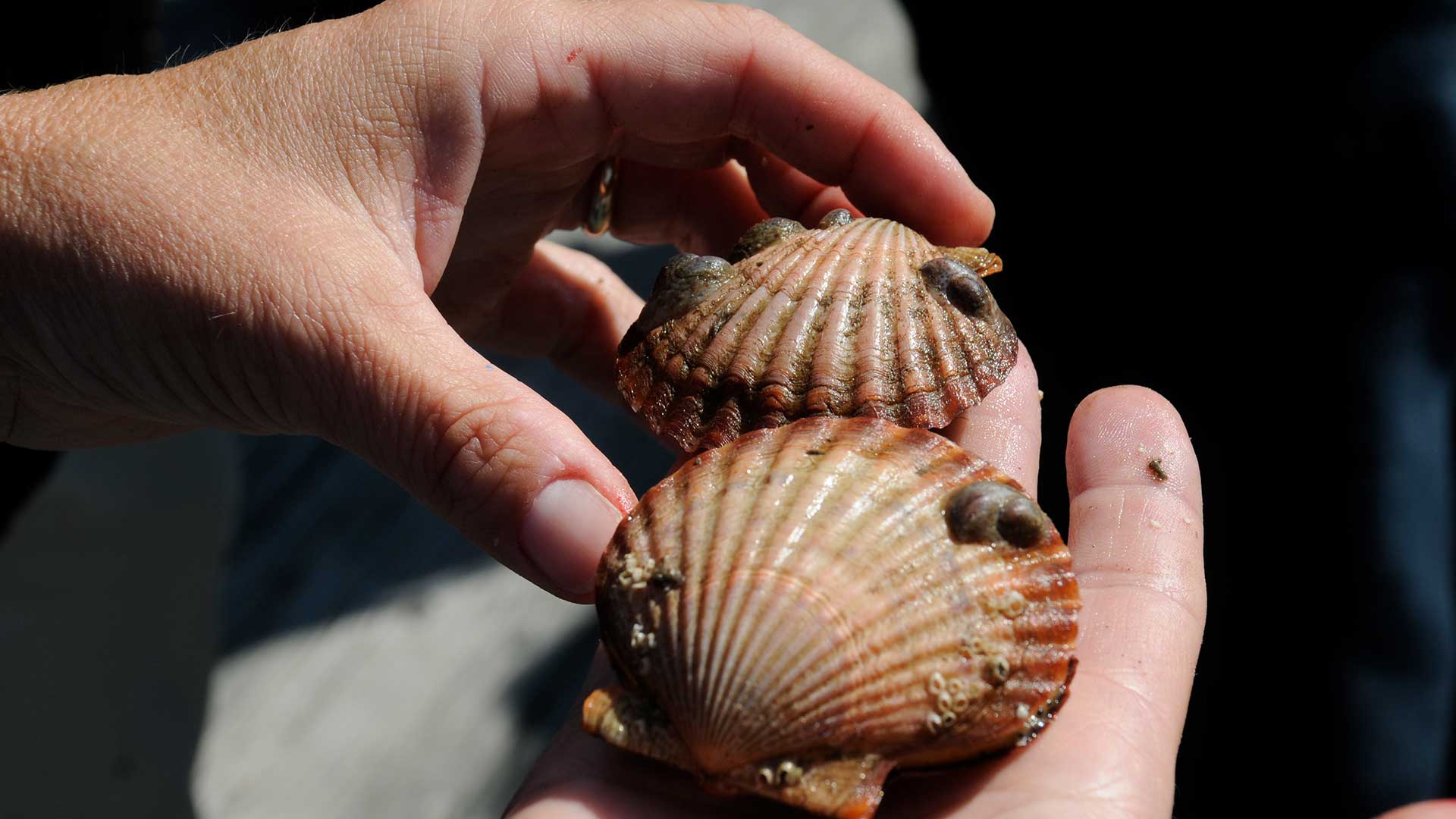WHOI working to address ocean acidification; protect region’s vital shellfish industry
February 9, 2021
Addressing the growing problem of ocean acidification in New England waters before it severely damages the region’s crucial shellfish industry is the focus of an important report by a commission of Massachusetts legislators, state environmental agencies, marine research and conservation organizations, and shellfish industry leaders. Woods Hole Oceanographic Institution (WHOI) is a part of the 18-member Massachusetts Special Legislative Commission on Ocean Acidification and helped co-author the 84-page report released today.
Upwards of 30 percent of excess carbon dioxide, caused by the burning of fossil fuels, has been absorbed by the ocean. The chemical reactions that occur as a result of increasing carbon dioxide concentration in the water, as well as nutrient runoff from farms and roads, makes the ocean more acidic. That can affect shellfish such as clams, oysters, scallops, mussels, and lobsters, and their ability to form and maintain healthy protective shells. Rising ocean temperatures also impede shell formation. These growing problems in the coastal waters have a direct impact on the seafood industry economy in Massachusetts, which in 2016 alone supported 87,000 jobs and generated $7.7 billion in sales, the vast majority coming from scallops and lobsters.
Massachusetts currently boasts the second highest number of seafood industry-supported jobs in the country after California. According to the new report, Massachusetts also contains some of the most acidification-vulnerable communities in the country and will be disproportionality affected, as the shellfish industry in the U.S. is predicted to lose more than $400 million annually by 2100 as a result of ocean acidification. All of this comes as the aquaculture industry is expanding, with more oyster farms across Southeastern Massachusetts.
Emiley Lockhart, Director of Regional Initiatives at WHOI and a member of the Special Commission said, “Massachusetts is home to a staggering amount ocean science. We applaud the legislature and the governor for leveraging the assets located in our own backyard, while promoting the blue economy, and protecting our ocean’s future.”
The Ocean Acidification Commission report is the culmination of a year-long effort to lay out a pathway to mitigate Massachusetts' rapidly acidifying coastal waters and protect the state's valuable shellfish industry.
Among the key findings and recommendations in the report include:
- The impact of ocean acidification can be mitigated by implementing policies that reduce nutrient pollution, restore coastal wetlands, and improve coastal monitoring. Some include planting more marine algae such as kelp to help absorb carbon dioxide and reduce acidification and by spreading waste shells near oyster beds to help increase carbonate concentration in the water.
- The state should invest in research and monitoring systems to quantify the effects of acidification on local shellfishing communities, on the state economy, and on commercially valuable marine species.
- Massachusetts should establish a “Blue Communities” Program to incentivize communities to start cost-effective green infrastructure projects, and incorporate conservation principles into local ordinances and zoning laws.
“Both natural drivers of seawater chemistry and increased human impacts through nutrient pollution to our coastal estuaries can lead to acidification and are a reason for concern," said Jennie Rheuban, research specialist, Marine Chemistry and Geochemistry at WHOI, and a research coordinator at the Woods Hole Sea Grant. "WHOI and other institutions in the Commonwealth have the capabilities—both scientifically and technologically—to advance our knowledge and offer solutions to address the problem. WHOI researchers are at the forefront of helping to expand our understanding of this problem, including the development of new technologies to improve monitoring capabilities and conducting field and modeling studies that investigate responses of shellfish species to acidification."
The Commission includes State Rep. Smitty Pignatelli, State Sen. Anne Gobi, State Sen. Julian Cyr, State Rep. Dylan Fernandes, State Sen. Joan Lovely, State Sen. Patrick O’Connor, State Rep. Sarah Peake, State Rep. Mathew Muratore, and representatives from Cottage City Oysters, the state Office of Coastal Zone Management, the Massachusetts Lobsterman’s Association, Woods Hole Oceanographic Institution, the state Department of Marine Fisheries, North and South Rivers Watershed Association, Marine Biological Laboratory, and the state Department of Environmental Protection.
“Ocean acidification is not an unsolvable problem—its harmful impact can and will be diminished through the combined work of first-class science and political resolve,” said Lockhart

